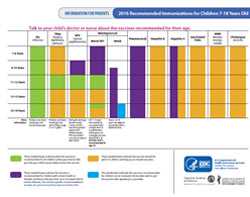Put Vaccination on Your Back-to-School List
 When you’re getting your kids ready for the upcoming school year, make sure to include back-to-school vaccine appointments on your checklist.
When you’re getting your kids ready for the upcoming school year, make sure to include back-to-school vaccine appointments on your checklist.
While vaccines are often thought of as something for babies and young children, preteens and teens also need vaccines to stay healthy throughout the school year. Vaccination protects preteens and teens against serious and potentially life-threatening diseases, including meningitis and cancers caused by HPV infections.
These diseases are still around and very real. When children are not vaccinated, they are at increased risk for diseases and can also spread diseases to others in their classrooms and community.
Is your preteen up to date?
CDC recommends four vaccines for boys and girls when they are 11 or 12 years old. If your preteen or teen hasn’t received these vaccines, talk to your doctor about getting it for them right away. These vaccines include:
Many adolescents are not getting all the vaccines they need. Preteens and teens are regularly getting their Tdap and meningococcal vaccines, but many preteens and teens are not getting all the recommended HPV shots or their annual flu shot. Check out the easy-to-read immunization schedule to find out which vaccines CDC recommends for your child.

-
Quadrivalent meningococcal conjugate vaccine
Quadrivalent meningococcal conjugate vaccine protects against some of the bacteria that can cause infections of the lining of the brain and spinal cord (meningitis) and bloodstream infections (bacteremia or septicemia). These illnesses can be very serious, even fatal. -
HPV vaccine
Human papillomavirus (HPV) vaccines help protect against HPV infections that cause cancer. All boys and girls should finish the HPV vaccine series before their 13th birthday. -
Tdap vaccine
Tdap vaccine protects against three serious diseases: tetanus, diphtheria, and pertussis (also called whooping cough). -
Flu vaccine
Preteens and teens should get a flu vaccine every year by the end of October, if possible. It is very important for preteens and teens with chronic health conditions like asthma or diabetes to get the flu shot, but the flu can be serious for even healthy kids.
Be sure to check with the doctor to make sure that your preteen is up to date on all the vaccines they need. They may need to “catch up” on vaccines they might have missed when they were younger.
Need help paying for vaccines?
Most health insurance plans cover the cost of vaccines. If you don’t have insurance, or if it does not cover vaccines, the Vaccines for Children (VFC) program may be able to help. The Vaccines for Children (VFC) program provides vaccines for children ages 18 years and younger, who are not insured, Medicaid-eligible, or American Indian or Alaska Native.
- Page last reviewed: August 22, 2016
- Page last updated: August 22, 2016
- Content source:
- National Center for Immunizations and Respiratory Diseases
- Page maintained by: Office of the Associate Director for Communication, Digital Media Branch, Division of Public Affairs




 ShareCompartir
ShareCompartir